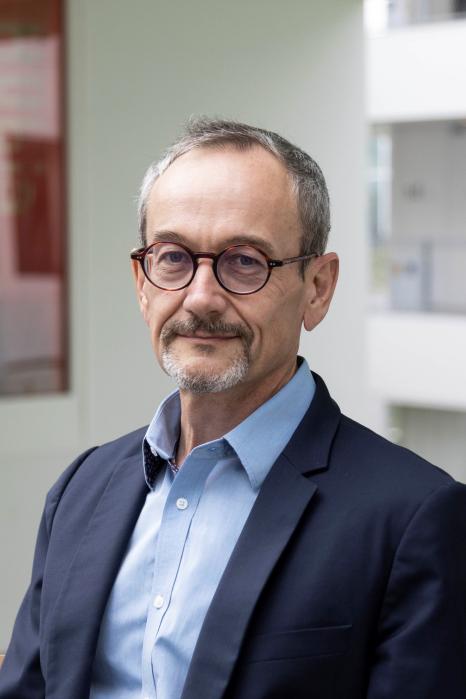
Bernard Yannou: creating utility through design methods
Bernard Yannou is Director of the Industrial Engineering Research Laboratory (LGI - Univ. Paris-Saclay, CentraleSupélec), a distinguished Professor in design science and industrial engineering, and Assistant to the Director of Research, responsible for promoting researchers' deeptech projects. A specialist in design engineering and the management of corporate innovation projects, for the past two years he has been working on applying design sciences to the circular economy. He is also involved in deeptech entrepreneurship.
At an age when most children were playing with LEGO®, Bernard Yannou was already dreaming of devising construction plans. "If someone had asked me back then what I wanted to do, I would certainly have answered 'inventor of worlds'," he recalls. Later fascinated by what he calls great "designer-entrepreneurs" such as Gustave Eiffel, he decided to pursue his childhood dream and focus on the design sciences.
Bernard Yannou began studying mechanical design at the École Normale Supérieure de Cachan (ENS Cachan, now ENS Paris-Saclay). He passed his teaching diploma (agrégation) in mechanics in 1988, and the following year obtained a diploma of advanced studies (DEA, now equivalent to a 2nd year Master's in research) in computer science, CAD and graphic algorithms at the Écoles des Mines de Paris. "Curious about the possibilities of automatic design, I decided to write my thesis on the early days of automatic design by expert systems and automatic dimensioning using constraint programming techniques," says Bernard Yannou. This was an opportunity for the young researcher to work under the supervision of Jean-Claude Bocquet, who was in the process of creating the Industrial Research Engineering Laboratory (LGI). He joined the LGI on completion of his thesis and became its Director in 2015, at the same time becoming a project leader and then lecturer at École Centrale Paris (now CentraleSupélec).
Taking complexity into account in design methods
When he began his career as a lecturer, Bernard Yannou quickly realised that when people spoke of "industrial engineering", they often thought of "production lines". "But what really interested me personally was the design of complex systems. Not just one product, but a family of products. Not just design, dimensional optimisation and the industrial processes to be implemented, but the work involved in understanding user needs, the conceptualisation giving rise to a diversity of architectures - or solution concepts - and reflecting on the impact of a design alternative," explains Bernard Yannou. The lecturer has dedicated almost 30 years of his career to integrating this complexity into design methods. "From technical design, I moved on to the design of value propositions - product, service, organisation - then to innovation that was useful for users and profitable for the company, and finally to entrepreneurship."
Bernard Yannou has also taken a step away from the traditional "industrial engineering" approach to teaching. Alongside the design and innovation courses he teaches to 2nd and 3rd year CentraleSupélec engineering students, in 1995 he became involved in the school's Industrial Engineering DEA, transforming it into the Complex Systems Engineering (CSE) master's degree at Université Paris-Saclay in partnership with ENS Paris-Saclay and Université d'Évry. Furthermore, in 2009 he helped create the 3rd year occupational pathway preparing students for careers as product, innovation and R&D managers in companies. "For me, creating this pathway was an exciting adventure, because at the time, it was a way of reconnecting with the traditional role of the Centrale engineer as a designer of complex systems and innovator for industry, which I personally admired so much."
From functional analysis to Radical Innovation Design® (RID)
After fifteen years of researching and teaching design methods, Bernard Yannou has seen the persistent difficulty organisations have in asking themselves the right questions, particularly in terms of specifying needs and exploring innovation opportunities for their customers. Consequently, in 2010, he decided to develop Radical Innovation Design® (RID), a new computerised methodology implementing innovation processes guided by usage and the search for utility. "With RID, the idea was to move away from specification through a design brief and give priority to improving the understanding of the user experience in an area of activity. The ultimate aim is to guide innovators in the systematic exploration of problems and unexpressed user needs and in the provision of innovative solutions for those that are most pressing and for which existing competitive solutions are not very effective." An objective which has been achieved. This is evidenced by the validation of this new RID methodology by a number of industrial and commercial sectors, and Bernard Yannou's creation of the HyB'RID start-up in 2018 to add value to this methodology. In 2024, he has published an electronic book of 384 illustrated and interactive pages, which can be downloaded free of charge and is freely available to teachers, students and professionals who want to understand and start an RID study.
Integrating impact through eco-design and the circular economy
Convinced of the usefulness of the design sciences and designers' responsibility for the impact the products and services they design will have on tomorrow's lifestyles, Bernard Yannou introduced eco-design courses at École Centrale Paris in the early 2000s. A few years later, he created a team of eco-design researchers.
In 2020, he took a new step by deciding to dedicate all his thesis supervision to applying design sciences to sustainable development. "In addition to the eco-design of products and services, I became interested in the circular economy of organisations, and in particular how to help them make decisions in the direction of greater circularity," he explains. With this in mind, in February 2023, he launched the Alliance Circular-IT research chair to enable industrial companies and local authorities to measure and manage their circular economy performance. "With Circular-IT, our aim is to develop a methodology ranging from diagnosing the key activities of an industrial company or territory to implementing a digital platform for monitoring and improving circularity by all those involved in the organisation concerned."
A commitment to deeptech entrepreneurship, among other things...
While Bernard Yannou provides his research expertise to large organisations, he also lends his experience as a start-up founder to deeptech project leaders. Two years ago, he set up a Prematuration unit at CentraleSupélec to develop a deeptech ecosystem. This is intended to raise awareness of and support the development projects of researchers and PhD candidates, in as close proximity to these individuals as possible. "I've also made a commitment to the Université Paris-Saclay's Maison du Doctorat to develop a deeptech entrepreneurship pathway. The first building block of this is the Doctor in startup programme created a year ago to raise awareness among 20% of new PhD candidates of all the entrepreneurial dimensions of a deeptech project," adds the lecturer. This is far from his only commitment; he is President of the European Centre for Safety Studies and Risk Analysis (CEESAR, Centre européen d'études de sécurité et d'analyse des risques), which has been a key road safety organisation in France for the past 30 years. He is also a Director of SILVER VALLEY, a group of organisations involved in the Silver Economy that meets the needs and practices of senior citizens and their families.

